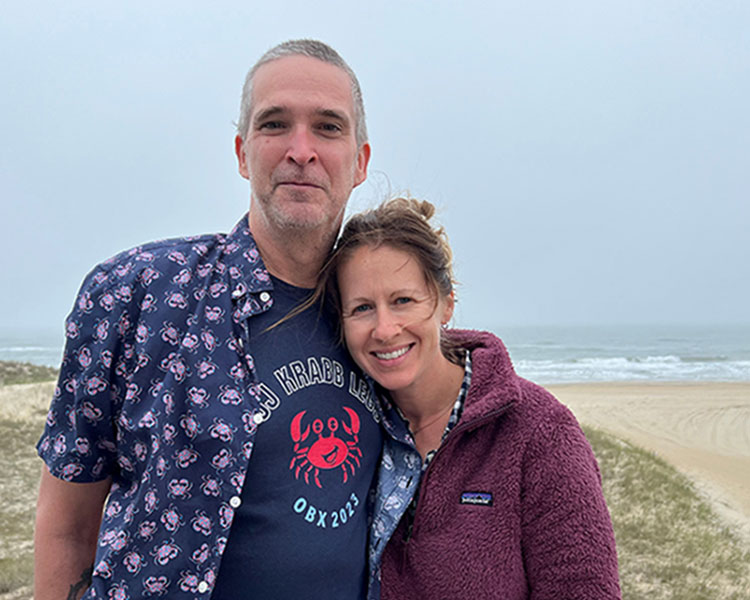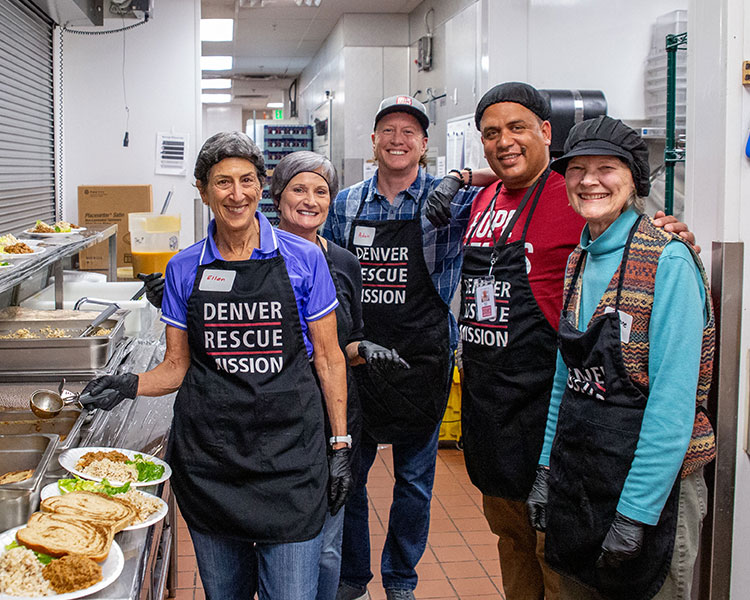Our neighbors experiencing homelessness often face a list of complex challenges, ranging from domestic abuse to chronic health concerns to physical disabilities and other forms of trauma. A common misconception is that the leading cause of homelessness is substance abuse, but The National Coalition for the Homeless emphasizes that many people instead turn to drug use after experiencing homelessness1.
Here at Denver Rescue Mission, we see this firsthand every day. Our case managers, counselors and front-line teams connect with each individual to better understand their unique situation and offer services, programs and resources on ways to move forward.
The prevalence of substance abuse and the number of lives lost to addiction each year continue to be on the rise. Since the start of the COVID-19 pandemic, the number of annual deaths by overdose increased by nearly 50% in the US.2
According to the latest Metro Denver Homeless Initiative Point in Time survey, more than a quarter of respondents said they struggled with substance abuse3.

Highly addictive substances such as opioids, methamphetamine and cocaine have created a public health crisis, and though the factors contributing to why people start to use and abuse substances may vary, we know that those experiencing homelessness are often at a higher risk.
Why Is Substance Abuse Common in the Homeless Experience?
Although everyone’s story is unique, there are some common factors that can contribute to substance abuse among unhoused populations, like hunger and harsh conditions, vulnerable demographics, and unexpected idle time.
Experiencing Hunger and Harsh Conditions
The dramatic shift people encounter when suddenly transitioning to life on the streets can cause a lot of uncertainty and fear. Here in Denver, we experience a wide range of difficult weather conditions, including bitter cold winter nights and hot, dry summer days. Combined with hunger and a lack of safety, stability and shelter, many people may find themselves turning to substance use as a coping mechanism, including individuals like Shane.
Using substances to escape these high stress situations only intensifies the very problems that are causing someone’s homeless experience to begin with, creating a vicious cycle that is extremely hard to break. And when each day is intensely focused on just finding food and shelter to survive, long-term recovery can simply become a low priority.

After hearing about the Mission’s New Life Program, Shane knew that was the path he needed to take to escape the grasp of addiction. Read more of Shane’s story in “The Driving Force of Faith.”
“I had just given up. All winter, you get high so you can run around all night because you can’t sleep because it’s too cold. It’s a horrible life.”
Shane, New Life Program
Vulnerable Demographics
In addition to the environmental stressors people experiencing homelessness may face, the American Addiction Centers says personal struggles, past trauma, untreated mental illness, and the social acceptance or easy access to substances among unhoused communities make these demographics extremely vulnerable to substance abuse4. That’s exactly the story we hear at Denver Rescue Mission every day. The lack of a proper support systems makes it easy for people in need to be taken advantage of by those who encourage these harmful practices.
37% of individuals experiencing homelessness in our city struggle with mental health concerns, and 30% struggle with a chronic health condition, according to the Metro Denver Homeless Initiative.
Sometimes an individual’s addiction may cause them to be estranged from friends and family, which can increase the feeling of isolation, giving someone the impression that they have no one else to turn to. This can lead to or reinforce feelings of depression which may reinforce harmful coping mechanisms. Add in complex problems that may be caused by mental health or physical disabilities, and it’s easy to see how someone already struggling can become even more vulnerable.
Unexpected Idle Time
One of the more surprising challenges that can contribute to substance abuse among those experiencing homelessness is simply idle time.
Finding employment or gathering lost legal documents necessary for next steps can be extremely difficult when unhoused. The extensive process of applying for a residency card or social security, trying to get an ID without any supporting documents, or waiting on subsidized housing lists can be discouraging. And maintaining structure, time management and focus throughout this process can be extremely difficult.
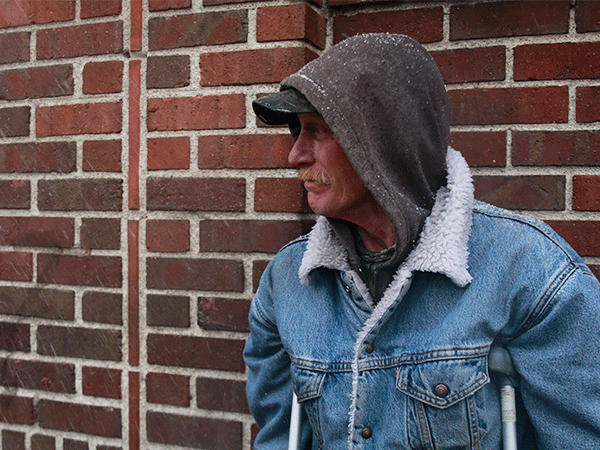
Deb Butte, Director of Homelessness Resolution, explained how each of these variables can take months or even years to complete. “Folks have to continue to meet with a case manager, respond to mail and make appointments for months and years before seeing any outcomes from their work,” said Deb.
It’s not as if someone who is experiencing homelessness simply has nothing to do. Every moment of every day is consumed with the struggle just to survive, and yet idle time that comes from waiting on necessary processes can be immeasurably frustrating and stressful. And that stress in-turn, can lead some to use drugs and alcohol as a negative coping mechanism.
Folks have to continue to meet with a case manager, respond to mail and make appointments for months and years before seeing any outcomes from their work.
Deb Butte, Director of Homelessness Resolution
How the Mission Helps
Denver Rescue Mission works to serve those experiencing homelessness by meeting them at their physical and spiritual points of need. For some, that includes challenges with substance abuse. And because those challenges are complex, the services and programs we offer are designed to help address each individual where they are and help put them on a path toward stability.
Safety From Harsh Conditions
One way we work to meet each individual’s needs is through our emergency services, providing meals, 24/7 and nightly shelter, daytime services, access to restrooms, and more. With basic needs met, people experiencing homelessness are able to make connections with staff that help them focus on more long-term goals, instead of constantly worrying about where they’ll sleep that night or if they’ll have food or safety.
Simply having a safe space to get proper rest can also have numerous benefits when it comes to the recovery process. When an individual is living on the streets and in constant fear for their safety, it may be difficult to get the adequate amount of sleep necessary to remain healthy. That is why having a safe environment that allows these individuals to get proper rest and avoid sleep deprivation can provide a clearer mental state and attitude in regards to recovery. You can learn more about how sleep affects homelessness in “Why Can’t I Sleep? Sleep Deprivation and Homelessness.”
The Mission’s rehabilitation and transitional programs also help providing stability and safety for those who are ready to take that next step in their journey toward self sufficiency. Getting off the street and out of the elements for a sustained period of time in one of our life-changing programs provides the stability necessary for someone to focus on themselves and dedicate time to building new skills as well as positive relationships and habits.
Community and Support for Vulnerable Demographics
While isolation and lack of support create vulnerable populations, at the Mission, we provide life-changing resources like:
- Positive community and connections
- Accountability to remain drug and alcohol free
- Life-skills classes
- Financial management training
- Case management
- Counseling
- And more (Learn more here.)
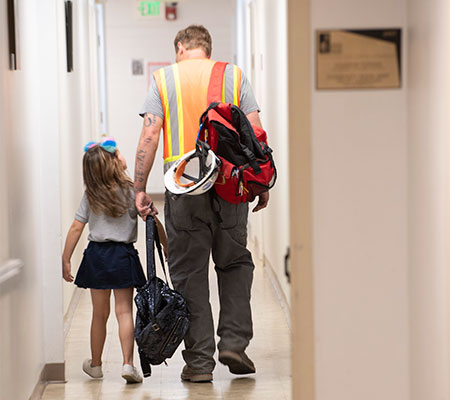
Engaging with shelter resources and case managers that are trauma-informed, can also be an effective step towards creating change in someone’s life. They may be able to access more resources to address mental health concerns and ultimately just feel seen and recognized for more than their unfortunate circumstances. At the Mission, we work to treat everyone that comes through our doors with dignity and respect. We see our guests as people, created in the image of God, just like each of us on staff or our community supporters.
For some, the connections and support provided through emergency overnight shelter are enough to help them make progress, and for others, we offer long-term programs that can help them dedicate focused time to rebuilding their lives.
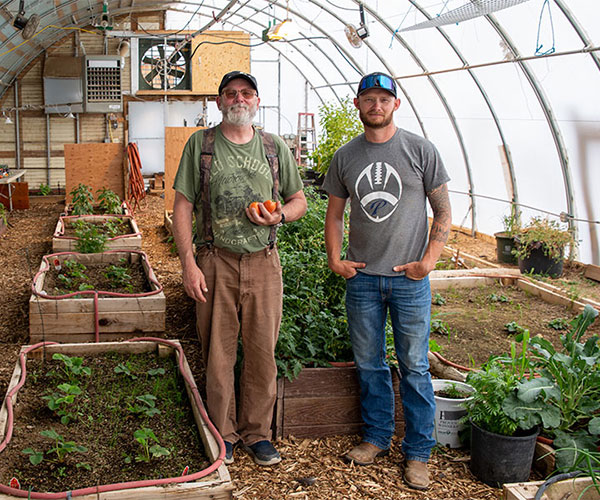
Program participants at Harvest Farm learn valuable life skills along with opportunities to slow down and connect with God’s creation.
A great example of this is our New Life Program at Harvest Farm, located in Wellington, CO. Separated from the temptations and triggers often found in the city, the rural environment at the Farm enables individuals to rebuild their lives without the constant reminders of their past lifestyle, habits, or negative influences. Instead participants are surrounded by positive community that understands their struggles and is focused on helping them overcome and move forward. You can learn more about how lives are changed at Harvest Farm in our story “Looking Up.”
For those who are on the verge of homelessness, we also offer community outreach through a food pantry and clothing, allowing guests to focus on utilizing their own income to remain housed. These services help to keep some people out of the shelter system to begin with, which typically results in a marked improvement on the time it takes someone to become stable and self-sufficient again.
Structure to Replace Idle Time
The structure provided by the Mission’s transitional programs and rehabilitation both in Denver and at Harvest Farm, keep individuals on track while also giving them space to breathe. Accountability and learning while working towards change can make the idle time much less daunting.
Terry Anderson, the Associate Clinical Director at the Mission, stresses the importance of structure in the recovery process. “In the beginning of a person’s recovery journey, there may be a significant deficit regarding one’s ability to create for themselves any consistency in daily life,” said Terry. “The internal mechanisms which help a person successfully navigate the world around them, skills such as emotional regulation, problem solving, and positive self-talk, may have been dramatically impaired as a result of extensive substance use or abuse.”
These factors can create prime conditions for someone becoming vulnerable, and that replacing or rebuilding of structure in daily life significantly increases someone’s likelihood of success in the future.
Though the issues surrounding homelessness and substance abuse can be extremely complicated, we work to cultivate the necessary relationships and life skills that provide our guests and program participants the structure and community they need to continue working towards recovery and a new life.
In the beginning of a person’s recovery journey, there may be a significant deficit regarding one’s ability to create for themselves any consistency in daily life.
Terry Anderson, Associate Clinical Director
Celebrating Our Graduates
Our New Life Program at The Crossing as well as Harvest Farm work to provide the tools and mentorship our participants need during the process of rehabilitation and recovery. Here are statistics from 2023:
36
Crossing Graduates
48
Harvest Farm Graduates
86
1 Year Success Rate Combined
51
Crossing Mentor Matches
72
Harvest Farm Mentor Matches
You Can Help Too!
We appreciate your support as we work to continue to provide the stability and safety individuals struggling with homelessness and substance abuse need. You can donate, become a mentor, or find other opportunities to volunteer to help transform lives!
1https://nationalhomeless.org/wp-content/uploads/2017/06/Substance-Abuse-and-Homelessness.pdf






